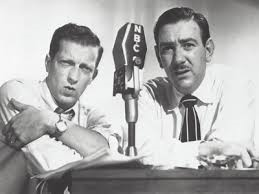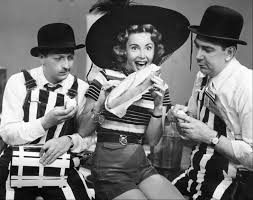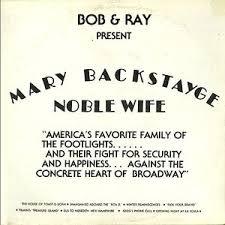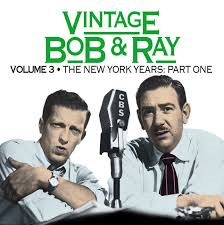In an age that has grown increasingly loud, Bob Elliott and Ray Goulding never abandoned the magic of soft.
Elliott, above left, died of throat cancer Tuesday at his home in Maine, age 92. He outlived Goulding by 26 years, but he never outlived or wanted to outlive their partnership, which produced some of the most beautifully understated verbal satire of the 20th century.
"They were unique," said their long-time producer Larry Josephson soon after learning of Elliott's death. "There was no one like them and I don't think there ever will be.
"I've gotten calls over the years from people wanting to license their scripts, and I turn them all down. No one else can do Bob and Ray."
For one thing, said Josephson, Bob and Ray the characters were pretty much Elliott and Goulding the individuals.
"They played who they were," said Josephson. "Ray was loud and blustery. Bob was a classic New Englander, a man of few words."
Elliott parlayed that into characters like Wally Ballou, a dogged and clueless newsman who often showed up at press conferences on the wrong day and always forgot to turn on his microphone until after he had started to speak.
Josephson said one of his favorite Ballou bits had Wally interviewing a cranberry grower in Times Square. While the grower said things like "You can eat them, but they're kind of sour," Ballou studiously ignored what was going on behind him, which included gunshots, sirens and cries for help.
"Our idea was to satirize media," Elliott said in a 1992 interview. "We heard pomposity everywhere, and we wanted to deflate it."
That extended from Wally Ballou to Western satire with Audrey Meadows (above), soap operas, commercials and whatever else wasn't recognizing its inner absurdity.
Josephson recalled a Queen for a Day satire in which the woman contestant needed an iron lung for her husband, and instead was sent away with a set of wire wheels and a tour of Disneyland.
Elliott's and Goulding's characters never broke their droll, wry delivery to suggest they sensed anything wrong, though Elliott admitted he and Goulding appreciated a good comic line.
"When we were in a commercial break or off-mic, we'd try to crack each other up," he said. "Thankfully, the audience didn't usually know."
"They were humor for smart people," said Josephson. "There was a lot of wordplay, a lot of jokes involving language.
"They didn't do slapstick, they were never blue. It was humor that made you think. It challenged you. And if they had a good bit, it could go on for a while."
"We were very good at keeping a topic alive after it should have been finished," Elliott said. "We'd take a 30-second issue and spin it out to six or seven minutes, and it got funnier as we kept building. We made mountains out of molehills."
They could also create absurd vignettes in real-life interviews.
During a joint interview in 1986, Goulding got up, produced a flyswatter, announced he was going to track down a heretofore unheard fly, and wove his way out of the room, holding the swatter in a ready position.
He never reappeared. Elliott continued to talk for another 10 minutes, never referencing Goulding's departure.
That obliviousness to the absurd was a cornerstone of Bob and Ray humor. The head of the Parsley Society of America lamented the decline in consumption. A bridge builder talked about going bankrupt while listeners heard cars splashing into the water behind him. The Bob and Ray Overstock Warehouse sold cans of corned beef stamped "San Juan Hill 1898."
Ironically, they also did a famous series of real-life ad spots, for Piels Beer.
"Bad beer, great ads," said Josephson.
Bob and Ray made only occasional television appearances, mostly as guests with admirers like Johnny Carson. One of their best-remembered TV moments came on Saturday Night Live in 1979, when they sat in chairs with bewildered expressions as Laraine Newman, Jane Curtin and Gilda Radner mouthed the lyrics to Rod Stewart's "Do Ya Think I'm Sexy."
Elliott acknowledged their comedy was more verbal than visual, noting it evolved out of their radio background.
Bob and Ray met at Boston radio station WHDH in 1946. Elliott was a disc jockey, Goulding a newscaster. During rainouts or delays in Red Sox games they began to improvise comic bits, and eventually they were given their own show.
"I don't know exactly how our chemistry worked," Elliott said. "We had the same sense of humor. We found the same things funny."
They moved to New York in 1951 and spent years on WOR, where they did three hours a day, five days a week.
"At first they ad-libbed everything," Josephson said. "But by the time they were on WOR, 15 hours a week, there was no way two people could produce that much material. So they hired Tom Koch."
Koch, whose seamlessly compatible comic voice almost turned the act in Bob and Ray and Tom, died last April.
Bob and Ray finished their main run with several years of Josephson-produced shows on National Public Radio in the 1980s -- though an extensive set of Josephson-produced CD packages continues to keep them contemporary.
"You'd be surprised," he said, "how many younger people hear them and love them."
After Goulding's death in 1990, said Josephson, "Bob was depressed for quite a while." But he kept working, including a guest stint with his son, the comedian Chris Elliott, in the Fox sitcom Get a Life. He was also a semi-regular guest on Garrison Keillor's The American Radio Company of the Air.
"You can hear Bob and Ray in Letterman, Leno, Carson, Al Franken, and pretty much every comedian since the 1950s," said Josephson. "I've remastered thousands of their shows over the years and I still get belly laughs. Bob and Ray are timeless."
Sign up for Peacock to stream NBCU shows.
to stream NBCU shows.




